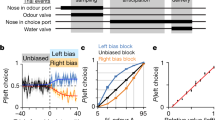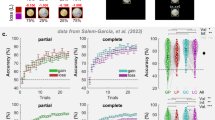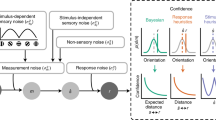Abstract
Humans and other animals must often make decisions on the basis of imperfect evidence1,2. Statisticians use measures such as P values to assign degrees of confidence to propositions, but little is known about how the brain computes confidence estimates about decisions. We explored this issue using behavioural analysis and neural recordings in rats in combination with computational modelling. Subjects were trained to perform an odour categorization task that allowed decision confidence to be manipulated by varying the distance of the test stimulus to the category boundary. To understand how confidence could be computed along with the choice itself, using standard models of decision-making3,4,5,6, we defined a simple measure that quantified the quality of the evidence contributing to a particular decision. Here we show that the firing rates of many single neurons in the orbitofrontal cortex match closely to the predictions of confidence models and cannot be readily explained by alternative mechanisms, such as learning stimulus–outcome associations7,8,9,10. Moreover, when tested using a delayed reward version of the task, we found that rats’ willingness to wait for rewards increased with confidence, as predicted by the theoretical model. These results indicate that confidence estimates, previously suggested to require ‘metacognition’11,12 and conscious awareness13,14, are available even in the rodent brain, can be computed with relatively simple operations, and can drive adaptive behaviour. We suggest that confidence estimation may be a fundamental and ubiquitous component of decision-making.
This is a preview of subscription content, access via your institution
Access options
Subscribe to this journal
Receive 51 print issues and online access
$199.00 per year
only $3.90 per issue
Buy this article
- Purchase on Springer Link
- Instant access to full article PDF
Prices may be subject to local taxes which are calculated during checkout





Similar content being viewed by others
References
Kahneman, D., Slovic, P. & Tversky, A. Judgment under Uncertainty: Heuristics and Biases (Cambridge Univ. Press, 1982)
Glimcher, P. W. Decisions, Uncertainty, and the Brain: The Science of Neuroeconomics (MIT Press, 2003)
Kim, J. N. & Shadlen, M. N. Neural correlates of a decision in the dorsolateral prefrontal cortex of the macaque. Nature Neurosci. 2, 176–185 (1999)
Bogacz, R. et al. The physics of optimal decision making: A formal analysis of models of performance in two-alternative forced-choice tasks. Psychol. Rev. 113, 700–765 (2006)
Mazurek, M. E., Roitman, J. D., Ditterich, J. & Shadlen, M. N. A role for neural integrators in perceptual decision making. Cereb. Cortex 13, 1257–1269 (2003)
Ratcliff, R. & Smith, P. L. A comparison of sequential sampling models for two-choice reaction time. Psychol. Rev. 111, 333–367 (2004)
Schoenbaum, G., Chiba, A. A. & Gallagher, M. Orbitofrontal cortex and basolateral amygdala encode expected outcomes during learning. Nature Neurosci. 1, 155–159 (1998)
Tremblay, L. & Schultz, W. Relative reward preference in primate orbitofrontal cortex. Nature 398, 704–708 (1999)
Padoa-Schioppa, C. & Assad, J. A. Neurons in the orbitofrontal cortex encode economic value. Nature 441, 223–226 (2006)
Wallis, J. D. Orbitofrontal cortex and its contribution to decision-making. Annu. Rev. Neurosci. 30, 31–56 (2007)
Smith, J. D., Shields, W. E. & Washburn, D. A. The comparative psychology of uncertainty monitoring and metacognition. Behav. Brain Sci. 26, 317–339 340–373 (2003)
Foote, A. L. & Crystal, J. D. Metacognition in the rat. Curr. Biol. 17, 551–555 (2007)
Persaud, N., McLeod, P. & Cowey, A. Post-decision wagering objectively measures awareness. Nature Neurosci. 10, 257–261 (2007)
Koch, C. & Preuschoff, K. Betting the house on consciousness. Nature Neurosci. 10, 140–141 (2007)
Uchida, N. & Mainen, Z. F. Speed and accuracy of olfactory discrimination in the rat. Nature Neurosci. 6, 1224–1229 (2003)
Bechara, A., Damasio, H., Tranel, D. & Damasio, A. R. Deciding advantageously before knowing the advantageous strategy. Science 275, 1293–1295 (1997)
Critchley, H. D., Mathias, C. J. & Dolan, R. J. Neural activity in the human brain relating to uncertainty and arousal during anticipation. Neuron 29, 537–545 (2001)
Grinband, J., Hirsch, J. & Ferrera, V. P. A neural representation of categorization uncertainty in the human brain. Neuron 49, 757–763 (2006)
Hsu, M. et al. Neural systems responding to degrees of uncertainty in human decision-making. Science 310, 1680–1683 (2005)
Tobler, P. N., O'Doherty, J. P., Dolan, R. J. & Schultz, W. Reward value coding distinct from risk attitude-related uncertainty coding in human reward systems. J. Neurophysiol. 97, 1621–1632 (2007)
Barraclough, D. J., Conroy, M. L. & Lee, D. Prefrontal cortex and decision making in a mixed-strategy game. Nature Neurosci. 7, 404–410 (2004)
Sugrue, L. P., Corrado, G. S. & Newsome, W. T. Matching behavior and the representation of value in the parietal cortex. Science 304, 1782–1787 (2004)
Lau, B. & Glimcher, P. W. Dynamic response-by-response models of matching behavior in rhesus monkeys. J. Exp. Anal. Behav. 84, 555–579 (2005)
Stephens, D. W. & Krebs, J. R. Foraging Theory (Princeton Univ. Press, 1986)
Behrens, T. E., Woolrich, M. W., Walton, M. E. & Rushworth, M. F. Learning the value of information in an uncertain world. Nature Neurosci. 10, 1214–1221 (2007)
Yu, A. J. & Dayan, P. Uncertainty, neuromodulation, and attention. Neuron 46, 681–692 (2005)
Dayan, P., Kakade, S. & Montague, P. R. Learning and selective attention. Nature Neurosci. 3 (Suppl). 1218–1223 (2000)
Luck, S. J., Hillyard, S. A., Mouloua, M. & Hawkins, H. L. Mechanisms of visual-spatial attention: Resource allocation or uncertainty reduction? J. Exp. Psychol. Hum. Percept. Perform. 22, 725–737 (1996)
Knill, D. C. & Pouget, A. The Bayesian brain: The role of uncertainty in neural coding and computation. Trends Neurosci. 27, 712–719 (2004)
Hampton, R. R. Rhesus monkeys know when they remember. Proc. Natl Acad. Sci. USA 98, 5359–5362 (2001)
Feierstein, C. E. et al. Representation of spatial goals in rat orbitofrontal cortex. Neuron 51, 495–507 (2006)
Barraclough, D. J., Conroy, M. L. & Lee, D. Prefrontal cortex and decision making in a mixed-strategy game. Nature Neurosci. 7, 404–410 (2004)
Sugrue, L. P., Corrado, G. S. & Newsome, W. T. Matching behavior and the representation of value in the parietal cortex. Science 304, 1782–1787 (2004)
Lau, B. & Glimcher, P. W. Dynamic response-by-response models of matching behavior in rhesus monkeys. J. Exp. Anal. Behav. 84, 555–579 (2005)
Daw, N. D., O'Doherty, J. P., Dayan, P., Seymour, B. & Dolan, R. J. D Cortical substrates for exploratory decisions in humans. Nature 441, 876–879 (2006)
Roesch, M. R., Taylor, A. R. & Schoenbaum, G. Encoding of time-discounted rewards in orbitofrontal cortex is independent of value representation. Neuron 51, 509–520 (2006)
Hansen, P. C. Rank-deficient and Discrete Ill-posed Problems: Numerical Aspects of Linear Inversion (SIAM, 1998)
Davison, A. C. & Hinkley, D. V. Bootstrap Methods and Their Application (Cambridge Univ. Press, 1997)
Hikosaka, K. & Watanabe, M. Delay activity of orbital and lateral prefrontal neurons of the monkey varying with different rewards. Cereb. Cortex 10, 263–271 (2000)
Wallis, J. D. & Miller, E. K. Neuronal activity in primate dorsolateral and orbital prefrontal cortex during performance of a reward preference task. Eur. J. Neurosci. 18, 2069–2081 (2003)
Gottfried, J. A. O’Doherty, J. & Dolan, R.J. Encoding predictive reward value in human amygdala and orbitofrontal cortex. Science 301, 1104–1107 (2003)
Simmons, J. M., Ravel, S., Shidara, M. & Richmond, B. J. A comparison of reward-contingent neuronal activity in monkey orbitofrontal cortex and ventral striatum: guiding actions toward rewards Ann . N.Y. Acad. Sci. 1121, 376–394 (2007)
Efron, B. & Tibshirani, R. An Introduction to the Bootstrap (Chapman & Hall, 1993)
Laubach, M., Wessberg, J. & Nicolelis, M. A. Cortical ensemble activity increasingly predicts behaviour outcomes during learning of a motor task. Nature 405, 567–571 (2000)
Keren, G. On the calibration of probability judgments. Some critical comments and alternative perspectives. J. Behav. Decis. Making 10, 269–278 (1997)
Acknowledgements
We thank J. Paton, A. Pouget, S. Raghavachari, G. Turner and members of the Mainen laboratory for comments on the manuscript. Support was provided by the National Institutes of Health (NIDCD) (Z.F.M.), the Center for the Neural Mechanisms of Cognition at Cold Spring Harbor Laboratory (Z.F.M.), and the Swartz Foundation (A.K., N.U., Z.F.M).
Author information
Authors and Affiliations
Corresponding authors
Supplementary information
Supplementary Information
The file contains Supplementary Notes and Supplementary Figures 1-8 with Legends. (PDF 1030 kb)
Rights and permissions
About this article
Cite this article
Kepecs, A., Uchida, N., Zariwala, H. et al. Neural correlates, computation and behavioural impact of decision confidence. Nature 455, 227–231 (2008). https://doi.org/10.1038/nature07200
Received:
Accepted:
Published:
Issue Date:
DOI: https://doi.org/10.1038/nature07200
This article is cited by
-
Backward masking in mice requires visual cortex
Nature Neuroscience (2024)
-
Dopamine precursor depletion affects performance and confidence judgements when events are timed from an explicit, but not an implicit onset
Scientific Reports (2023)
-
Modeling fashion as an emergent collective behavior of bored individuals
Scientific Reports (2023)
-
Electrophysiological population dynamics reveal context dependencies during decision making in human frontal cortex
Nature Communications (2023)
-
Studying the neural representations of uncertainty
Nature Neuroscience (2023)
Comments
By submitting a comment you agree to abide by our Terms and Community Guidelines. If you find something abusive or that does not comply with our terms or guidelines please flag it as inappropriate.



